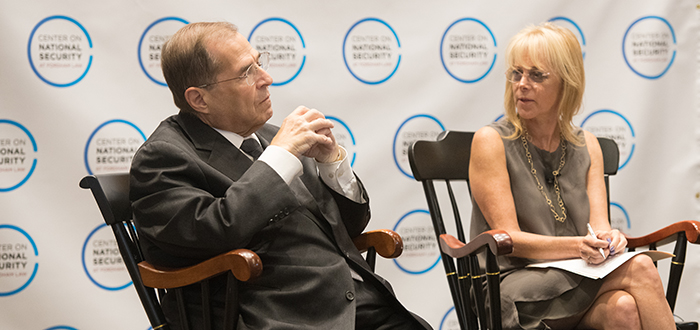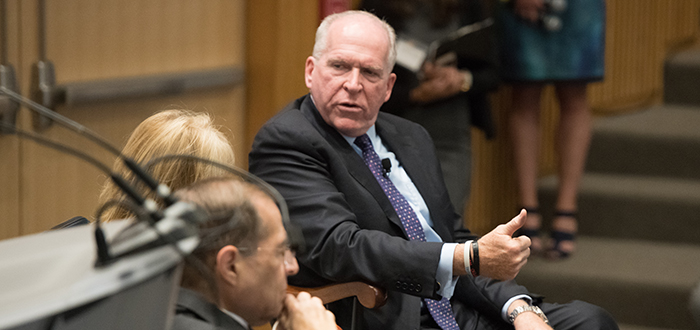In a New York Times opinion piece last month, former CIA director John Brennan described as “hogwash” President Trump’s claims that there was no collusion with the Russians during the 2016 election. So it’s no surprise that Brennan, distinguished fellow at the Center on National Security, took Trump to task again at a September 4 event at Fordham Law.
Trump “seeks to delegitimize those things that make this country great,” Brennan said, later adding that the president, unlike previous chief executives whom Brennan has served, pursues his “own interests above all else.”
Brennan was joined by Fordham Law alumnus and congressman Jerrold Nadler ’78, U.S. Representative from New York’s 10th congressional district, who, like Brennan, has been outspoken in his criticism of President Trump for the past two years.

In response to a question about the future of the rule of law in the United States, Nadler, the ranking member of the House Judiciary Committee, stressed his belief that the “rule of law [is]imperiled” by Trump’s actions. Citing the 2018 book How Democracies Die, Nadler pointed to the ways in which authoritarian leaders eroded democracies in the past through attempts to silence the press and the questioning of election results. The parallels between the early stages of these crumbling democracies and the current state of Trump’s America, Nadler concluded, are striking.
Moderated by Karen J. Greenberg, the director of the Center on National Security, the conversation began with a 45-minute discussion that touched on topics such as cybersecurity, 2016 election meddling, and the future of American democracy. Brennan began by stressing his own nonpartisan status and maintaining the importance of allowing Robert Mueller’s investigation to come to a conclusion without interference. Nadler, a Democrat with a consistently liberal voting record in Congress, also voiced his support for the Mueller probe, while clarifying a few issues.
There was “clearly collusion in the election,” Nadler stated, giving the example of Donald Trump Jr.’s infamous Trump Tower meeting. The real questions, Nadler emphasized, have to do with provable, concrete violations of law and President Trump’s personal knowledge of any Russian collusion. If evidence were to come out that Trump was personally involved in any Russian collusion, Nadler said, “the most serious consequences” would be warranted. “All options would have to be on the table.”
When asked if Trump can rightly be called an outlier in the grand scheme of American political history, Brennan cited Trump’s frequent undermining of law enforcement agencies on Twitter, especially with regards to the ongoing Russian collusion investigation. Brennan called Trump’s actions a “break from past practice.”

Cybersecurity was another issue of concern, prompting questions from Greenberg, as well as several audience members. Nadler tackled the issue of electronic voting, admitting that the vulnerability of America’s electronic voting machines remains a significant problem. Brennan, for his part, called for the creation of an independent, bipartisan commission for the cyber environment.
In closing remarks, Nadler and Brennan each took the opportunity to address what they considered the most pressing issues for the United States to grapple with in the immediate future. For Nadler, a main concern is big money in politics, and the way it can break down a democracy that is supposed to give power to the everyman. “The power of money in politics today is a metastasizing cancer,” he said.
For Brennan, the issue of the day is polarization. As an outspoken critic of the current president, Brennan knows that it can be difficult to speak out against injustice in a way that will lead to practical results. “I have to remind myself not just to be critical, but to be constructive,” he said.
“[D]iscussions like this are very important,” Brennan said. “I think Congressman Nadler and other members of Congress should get together and speak openly and honestly about where we are right now in this country and the challenges we face.”
Photos by Dan Creighton.

